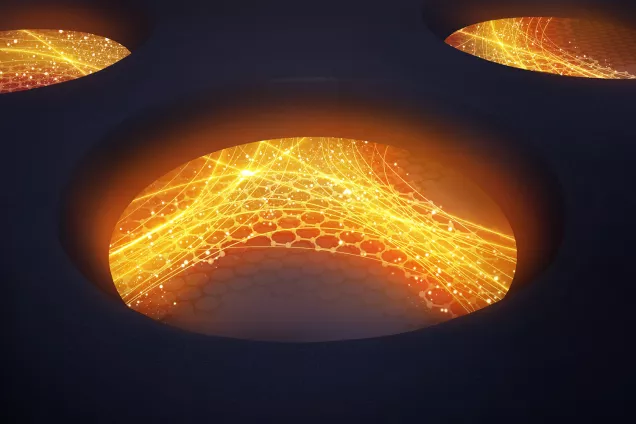The GCN - Seminar - Bo Wegge Laursen: Talk abstract and short bio
Bo Wegge Laursen, Professor at the University of Copenhagen and and Director of Nano-Science Center will present his research about super bright fluorescent molecular materials. He will present the supramolecular structures that allow for brighter floursecence and discuss possible uses in bio-sensing and imaging.
This seminar is given in the frame of series that is organized by the three nanoscience hubs located in the Copenhagen-Lund area. The aim is to to increase awareness about our mutual capabilities and to inspire collaborations.
19th February 2021: Bo Wegge Laursen, (KU): Super bright fluorescent molecular materials – concepts, challenges and prospective
Talk abstract
In this talk I will briefly introduce my research group and our work on design and synthesis of and fluorescents dye and nano materials for applications in sensing and imaging. The main focus of the talk will be on our recent development of a new type of generic supramolecular materials with super-bright and tunable fluorescence properties.
Extremely bright nanoparticles can in principle be obtained by packing hundreds of fluorescent dyes into one particle. However, this approach is for organic dyes limited by electronic coupling between dyes at short distances, which leads to spectral shifts and fluorescence quenching. We have developed a new class of supramolecular materials called small-molecule ionic isolation lattices (SMILES) solving this problem, by supramolecular control of the solid state packing, turning on intense solution-like fluorescence from crystals, thin films, and polymer blends, that otherwise would be quenched [1]. Very recently we have developed a method to make small (~20 nm) bio compatible nanoparticles using the SMILES principle [2]. I will present these result and discuss how the ultra-brightness and tunable photo physical properties might be used for new enhanced bio assays and imaging techniques.
[1] Benson, C. R.; Kacenauskaite, L.; VanDenburgh, K. L.; Zhao, W.; Qiao, B.; Sadhukhan, T.; Pink, M.; Chen, J.; Borgi, S.; Chen, C.-H.; Davis, B. J.; Simon, Y. C.; Raghavachari, K.; Laursen, B. W.; Flood, A. H., Plug-and-Play Optical Materials from Fluorescent Dyes and Macrocycles. Chem, 2020, 6 (8), 1978-1997.
[2] Junsheng, C.; S. M. Ali, F.; Laura, K.; Nicolai, B.; Stine Grønfeldt, S.; Jona, B.; Karen L., M.; Amar, F.; Bo W., L., Ultra-Bright Fluorescent Organic Nanoparticles Based on Small-Molecule Ionic Isolation Lattices. Angewandte Chemie International Edition, 2021, DOI: 10.1002/anie.202100950
Short Bio: Bo W. Laursen, Professor, University of Copenhagen, Denmark.
Bo W. Laursen is Professor of chemistry and Director of Nano-Science Center at University of Copenhagen. He obtained his Ph.D. in 2001, work carried out at Risø National Laboratory, Department of Condensed Matter Physics and Chemistry. In 2003-4 he was Post-Doctoral fellow at the University of California, Los Angeles in the group of Sir Fraser Stoddart. In 2004 he became affiliated with the Department of Chemistry at the University of Copenhagen as Assistant Professor, in 2009 as Associate Professor and in 2013 as full Professor.
Bo W. Laursen's main research interest lies within the areas of: design and synthesis of fluorescent molecules, molecular probes, fluorescence in organic nano materials, self-assembly in molecular materials.
By combining highly controlled building blocks from very different material systems to realize advanced, functional systems, we aim to jointly address challenges that are out of reach for an individual center.

A cluster of groups at DTU involved in nanoscience
Groups at DTU involved in nanoscience are affiliated to the following departments:

